Bastion
LQ: 9.15
Recommended Age: 10+
Skills Used: Planning, Working Memory, Mathematics, Reading
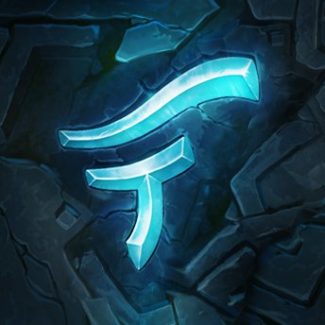
Faeria is a collectible card strategy game with a board game-like, customizable battlefield with three different modes available: solo, battle, and pandora. The player fills empty game spaces by drawing cards from a deck of collectible creatures, events, and structures. Both the player and the opponent (either AI or a random online player) have a set number of life points. Once the player’s creatures make it across the Faeria game board, the creature may attack the opponent’s life points directly.
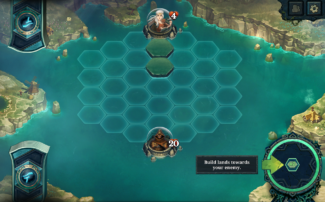 Solo Mode
Solo ModePlayers receive mission packs to unlock and complete in solo mode.
Each mission pack contains both quests (standard play) and puzzles (the player must beat the opponent in one turn). Each game or puzzle in Faeria’s solo mode provides experience, new cards, and other various rewards. The player can also meet an additional set of objectives to gain further rewards.
The player still gets basic game boards and faces off against an opponent in battle mode. However, there are no special missions, puzzles, or objectives. Instead, there are three sub-modes in which the player faces AI in practice mode. The player goes up against an online player in casual (low-pressure play) and ranked (attempting to raise standing as a Faeria player) modes.
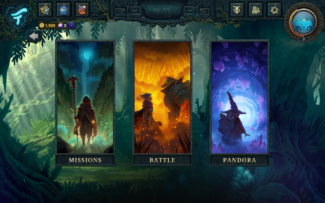 The goal of this mode is to create a streak, or run, of wins. The longer the player’s Pandora run, the bigger the rewards the player will receive. One of these rewards is “Pandora Points”. A player can collect points over the course of a Pandora season, unlocking more rewards based on their total. The player purchases a Pandora coin or earns one by using Pandora practice coins to play Pandora mode.
The goal of this mode is to create a streak, or run, of wins. The longer the player’s Pandora run, the bigger the rewards the player will receive. One of these rewards is “Pandora Points”. A player can collect points over the course of a Pandora season, unlocking more rewards based on their total. The player purchases a Pandora coin or earns one by using Pandora practice coins to play Pandora mode.
Faeria has infrequent/mild cartoon or fantasy violence and it’s ESRB rating is still pending. It is free to play, although Steam offers downloadable content packages and there are also in-game purchases available.
Faeria helps kids practice and improve the following skills:
Developing a systematic approach for setting and achieving goals.
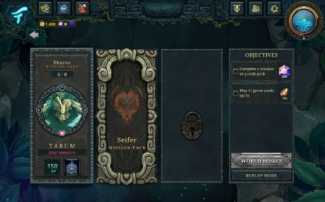 The player must have a solid, multi-step plan in place in order to be successful at Faeria. During game-play, the plan needs to include gathering faeria (game currency/energy), which land tiles to place, which creatures, events, and structures to place, and how to lower the other player's life points. There are also missions, objectives, and daily goals to keep in mind while playing solo mode. Longer term planning is required when building decks for solo and battle mode and drafting cards in Pandora mode. And the player must keep all of this in mind, adjusting and problem solving after every move their opponent makes. If the player fails to do this, their deck may not be strong enough or the opponent may battle down the player's life points and win. A player who struggles with planning can still have fun playing Faeria, but will be forced to play the same level(s) over again until they are successful in their planning.
The player must have a solid, multi-step plan in place in order to be successful at Faeria. During game-play, the plan needs to include gathering faeria (game currency/energy), which land tiles to place, which creatures, events, and structures to place, and how to lower the other player's life points. There are also missions, objectives, and daily goals to keep in mind while playing solo mode. Longer term planning is required when building decks for solo and battle mode and drafting cards in Pandora mode. And the player must keep all of this in mind, adjusting and problem solving after every move their opponent makes. If the player fails to do this, their deck may not be strong enough or the opponent may battle down the player's life points and win. A player who struggles with planning can still have fun playing Faeria, but will be forced to play the same level(s) over again until they are successful in their planning.
Being efficient and aware of our use of time and effort.
Time management is also an important cognitive skill when playing Faeria. During solo mode and Pandora mode, the player receives unlimited time to make their move but must still 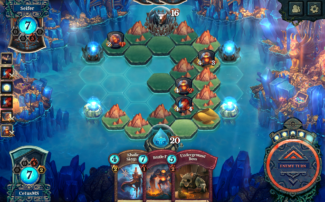 be efficient with their card choices and their effort. If they are not, they could waste a card's special attributes, lose a creature before it has a chance to attack the enemy, or even have to wait to play a card because the right land type is not available. Efficiency is extremely important, even without a timer pressuring the player to make a fast move. The player needs this efficiency in battle mode as well, but battle mode provides extra pressure in the form of a timer. This means a player must also be aware of the timer and how long their planning is taking. If they fail to keep track of their time, a player will lose their turn. And even one lost turn can be the difference between success and failure.
be efficient with their card choices and their effort. If they are not, they could waste a card's special attributes, lose a creature before it has a chance to attack the enemy, or even have to wait to play a card because the right land type is not available. Efficiency is extremely important, even without a timer pressuring the player to make a fast move. The player needs this efficiency in battle mode as well, but battle mode provides extra pressure in the form of a timer. This means a player must also be aware of the timer and how long their planning is taking. If they fail to keep track of their time, a player will lose their turn. And even one lost turn can be the difference between success and failure.
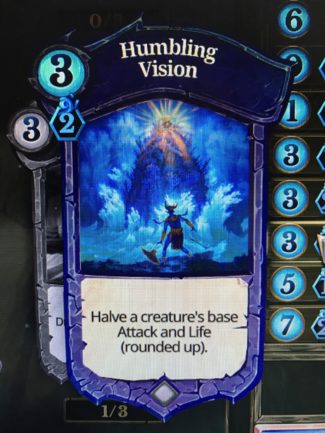 Faeria is full of basic math skills such as addition, subtraction, and basic logic. The player requires basic logic when weighing out the various options and determining which is the best. This is similar to when a student reads a story problem and needs to weigh which mathematical concept to use to solve it. The player uses basic addition and subtraction multiple times every round. First, they have to subtract a card's faeria cost from their faeria "bank" to determine whether or not they can play it. They also have to do addition and subtraction for any special attributes in their cards and for any creature movements and attacks they wish to do. If the player doesn't take the time to use their math skills, they will end up making errors that completely interfere with their plan and, ultimately, cause them to loose.
Faeria is full of basic math skills such as addition, subtraction, and basic logic. The player requires basic logic when weighing out the various options and determining which is the best. This is similar to when a student reads a story problem and needs to weigh which mathematical concept to use to solve it. The player uses basic addition and subtraction multiple times every round. First, they have to subtract a card's faeria cost from their faeria "bank" to determine whether or not they can play it. They also have to do addition and subtraction for any special attributes in their cards and for any creature movements and attacks they wish to do. If the player doesn't take the time to use their math skills, they will end up making errors that completely interfere with their plan and, ultimately, cause them to loose.
Even though there are a lot of cards with no writing on them other than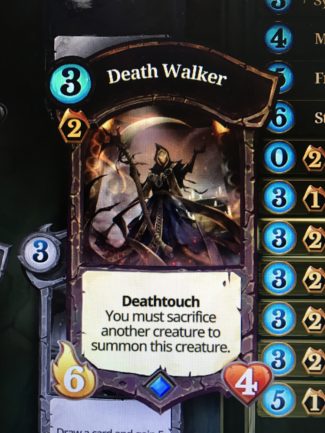
their name and cost, reading is still a vital part of Faeria. The player must use reading in order to build decks, choose how to use cards that have special skills, and achieve daily tasks and solo mode objectives. If the player does not take the time to use their reading skills to examine and get to know their cards, they will struggle to build stronger decks, which will lower their ability to win games in all three modes.
All membership plans come with full access to our entire suite of tools learning guides, and resources. Here are a few of the ones we think you’ll like the most: